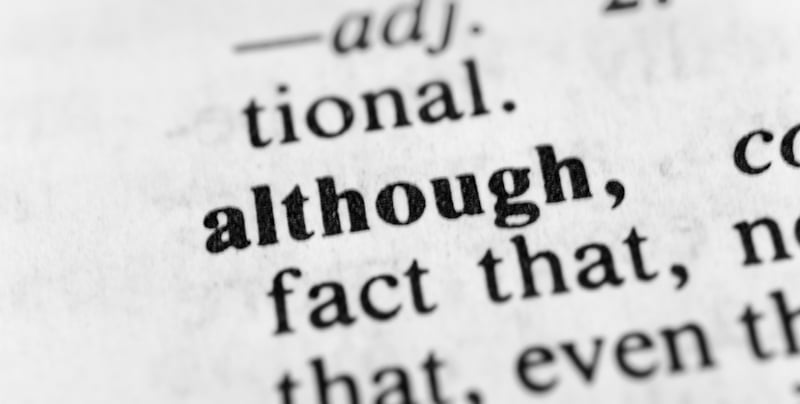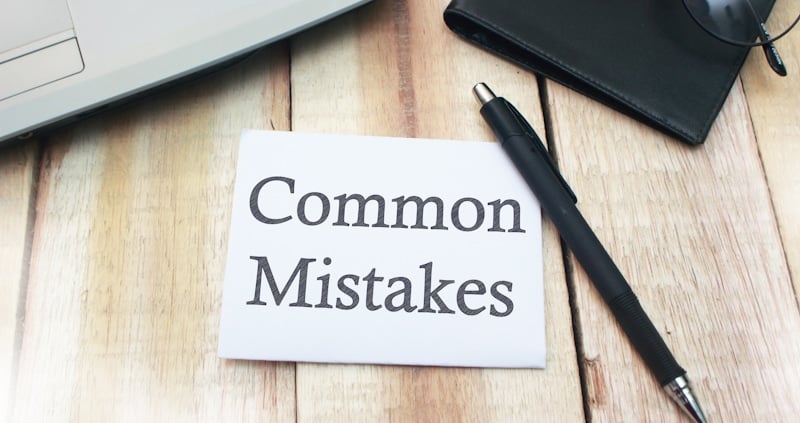The English language is filled with words that we don’t fully understand or often confuse with other words. The word “although” is one of them. Most people seem to think that “although” is interchangeable with other words such as “but” or “however”. Let’s take a closer look at the word “although” and how to correctly use it in sentences.
“Although” is actually a conjunction used to convey contrast. However, it can be challenging to know how and when to use it in a sentence. In simpler terms, “although” is used to introduce a subordinate clause which makes the information contained in the main clause relevant.
Definition of “Although”
“Although” is a conjunction or “joining word” that means “even though” or “in spite of the fact that.”
It is used to connect clauses, phrases, or sentences. But the word “although” is primarily used to contrast facts. So the word “although” can be used to say that something is true even if it seems to disagree with the other information, or express different feelings or connect statements that have different moods.
How to Use “Although” in a Sentence
The word “although” is similar to “in spite of” and “despite”“. Therefore, it is a means of communicating a contrast or revealing when two things are in conflict. Most people use “although” in a sentence to show a contrast.
Example: Although the park was crowded, they had an awesome time.
A contrast is used when your aim is to convey how two things are not alike, and a comparison is used to prove that two entities are the same or similar. So if you happen to use “although” when trying to weigh up or balance two things, it won’t make much sense at all.
Where to Position the Word “Although”
The word “although” may be positioned in the middle or beginning of a sentence. So “although” can be used to begin a sentence or alternatively may be placed in the middle of a sentence as a conjunction. However, it cannot be used to end a sentence. As a rule of thumb, “although” should be used at the beginning of a sentence or in the middle, after a comma.
Example: Although it gives him heartburn, he loves Pepsi.
Example: He loves Pepsi, although it gives him heartburn.
Where to Place the Noun or Subject
It is important to always use a subject after “although” when you write a sentence that involves “although.” The subject could be a noun such as a person, thing, place, or pronoun that replaces the noun, which may be “she,” “it,” “we,” or “they.”
Example: Although the event was filled to capacity, I still had a great time.
“the event” is the noun following “although.”
I ate the entire pizza, although it tasted disgusting. “it” is the pronoun that replaces “pizza” in the latter half of the sentence.
Following the subject with a Verb
Make use of a verb that describes the subject’s action after you place the subject of the sentence.
Example: My dogs are friendly, although they bark loudly.
“Bark” is the given verb that comes after the subject.
How to Enhance the Contrast Using Qualifiers and Adjectives
Adjectives and qualifiers may be incorporated once you’ve noted a sentence that includes both a verb and subject. This action aims to convey a more comprehensive idea and, of course, enhance the contrast you are trying to show.
Example: Instead of” Although Mike studied, he still failed.”
You may choose to say, “Although Mike studied daily, he still failed the history test.”
Common Mistakes to Avoid
The word “although” should be used in case you want to come across as more formal. Although “although” is seen quite regularly in the English language, it works in much the same way as other joining words like in spite of, despite, and even though. So it is suggested that you use”although” when your aim is to sound formal. But if you are in a casual setting and see it fit to sound more casual, then use words like “though” in place of “although.”
“Although” is not always interchangeable with “though.” “Though” and “although” can in many instances be used in the same types of sentences, but the word “though” is also used as an adverb. So what this means is that “although” is a conjunction and therefore cannot be used the way “though” can in all the same sentences or situations.
Example: On Thursday, though, the mail was busy. “though” in this example is an adverb and not a conjunction. So this sentence does not need a conjunction, and there is no use for the word “although” in it.
Lots of people believe that “although” can be used to replace “however.” These two words are sometimes not the same in terms of how you can use them, so while they have their similarities, you should not use them synonymously. The difference with “however” is that you may use it as an adverb and a conjunction. So “however” may take the place of “although” but not in all instances.
Example: Although his schedule was hectic, he still found the time to relax. This sentence would not make sense if you replaced “although” with “however.”
The word “however” may be used to start a sentence or can also be used after a semi-colon in the middle of a compound sentence. Irrespective of where in the sentence “however” is used, it should in all instances be followed by a comma, and that is the standard rule of thumb.
When using “although” in the middle of a sentence, place a comma before it.
When using “although” at the start of a sentence, you don’t need to use a comma after it.
Example: We had a fantastic day at the pool, although it rained. As you can see, the comma is placed before “although.” The sentence flows smoothly because the word “although” creates a pause.
Be Aware of Sentence Fragments
The word “although” has quite a specific usage and is sometimes mistaken for other words, and this causes a sentence fragment. So when using “although,” always check your statements and sentences for fragments and make the necessary corrections.
Example: Although, the bride was stunning.
Example Sentences with the Word “Although”
Examples with the Word “Although” Used at the Beginning
- Although weeping may endure for a night, joy comes in the morning.
- Although we suffer, we still overcome.
- Although she is young, she is still very independent.
- Although small, the kitchen is still designed well.
- Although she was ill, she went to work.
- Although she’s very old, she’s very active.
- Although the sun was shining, it still wasn’t very hot.
- Although I poured it with caution, it still spilt.
- Although persistence and patience are painful, they can still bring you great benefits.
- Although Jake was once involved in crime, he works hard and earns an honest living these days.
- Although he is poor, he has not lost his integrity.
- Although she entered the contest just for fun, she took first prize.
- Although I don’t have a car, I still get where I’m going.
- Although it doesn’t seem like it, the entire thing is well organized.
- Although they lived there for over a decade, the villagers still treat them as outsiders.
- Although the main characters in the movie are so true to life, they are all imaginary.
Examples with the Word “Although” Used in the Middle
- Certainly, this could happen, although the odds are remote.
- The wood appeared to be cherry, and although it could use a coat of wax, it still had a great shine.
- She always wanted kids, although this is not how she intended to start a family.
- I’m really looking forward to the concert, although there are a million things I need to get done first.
- Mary, although half her age, was still taller by an extra 2 inches.
- She joined Mark at the dining table, although Sharon would have preferred to be alone.
- This was true, although we were at a loss when it came to how she knew.
- She was an accomplished singer and songwriter, although not many had heard of her.
- She knew that there were 10 of us, although no information by conveyed to her.
- All of us took turns wishing Jane a good journey, although she insisted it was unnecessary.
- They loved speaking in their mother tongue, although it sounded strange to everyone else.
- It will be English, although not the language we speak currently.
- I love the winter season, although I hate feeling cold.
- My dogs are enormous, although they are still puppies.
- The thought did cross my mind that, although the dress wasn’t the most expensive, it still looked striking on my daughter.
Conclusion
So as you can see, the word “although” is a conjunction that is used quite often in the English language. But it is important to learn how and when to correctly use it in sentences, whether in the written or spoken form.
Shawn Manaher is the founder and CEO of The Content Authority. He’s one part content manager, one part writing ninja organizer, and two parts leader of top content creators. You don’t even want to know what he calls pancakes.




